外研版(2019)选择性必修二 Unit 4 Breaking boundaries Developing ideas 课件(共46张PPT)
文档属性
| 名称 | 外研版(2019)选择性必修二 Unit 4 Breaking boundaries Developing ideas 课件(共46张PPT) | 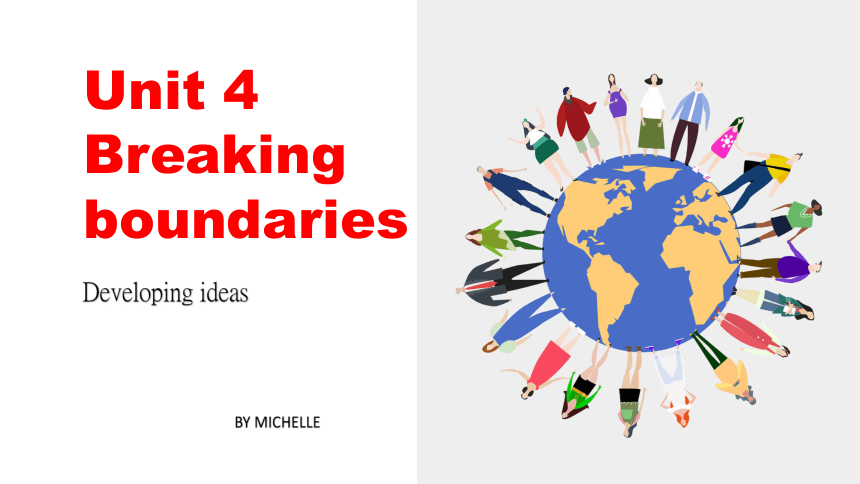 | |
| 格式 | pptx | ||
| 文件大小 | 45.4MB | ||
| 资源类型 | 教案 | ||
| 版本资源 | 外研版(2019) | ||
| 科目 | 英语 | ||
| 更新时间 | 2025-01-10 12:13:27 | ||
图片预览

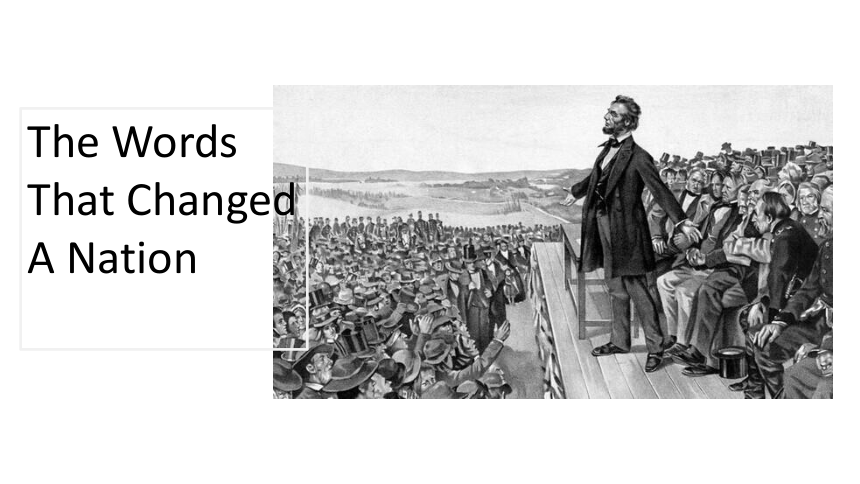
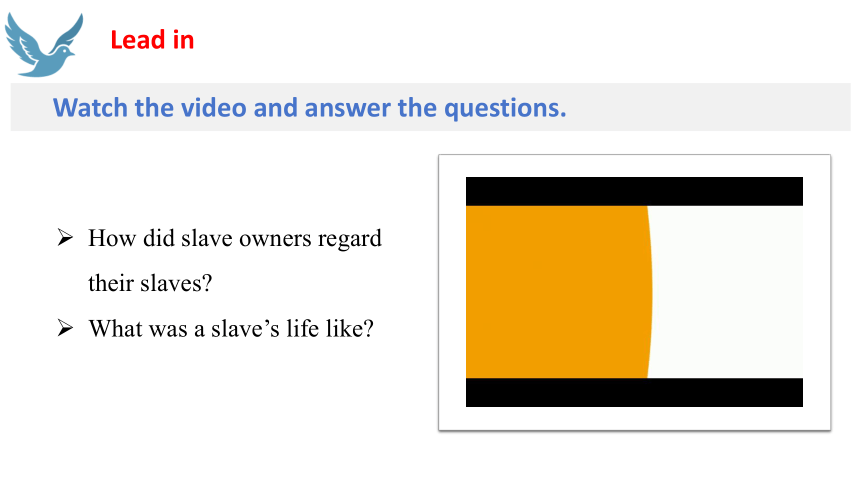
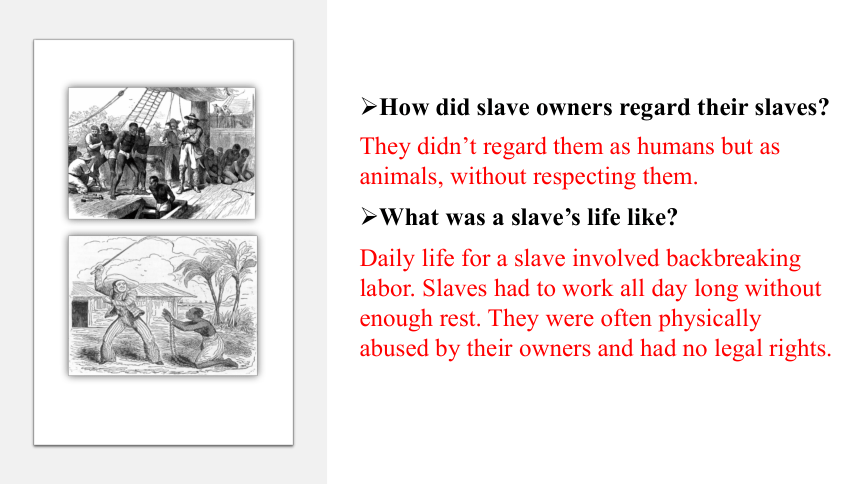
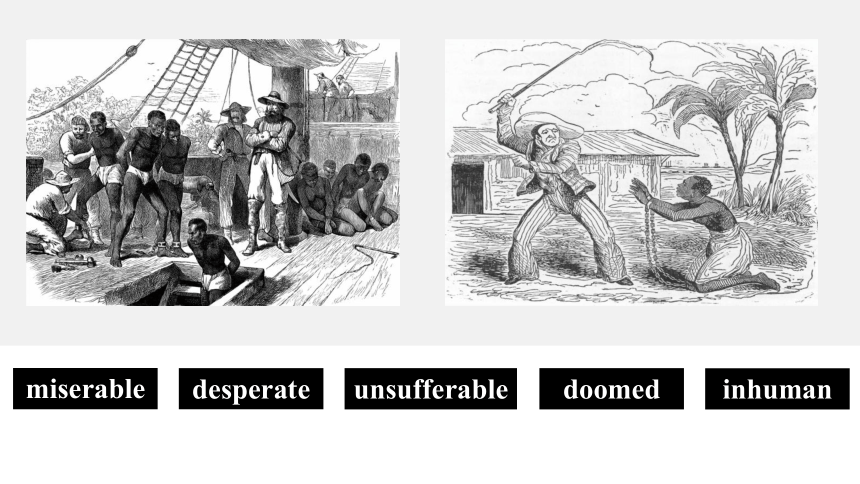

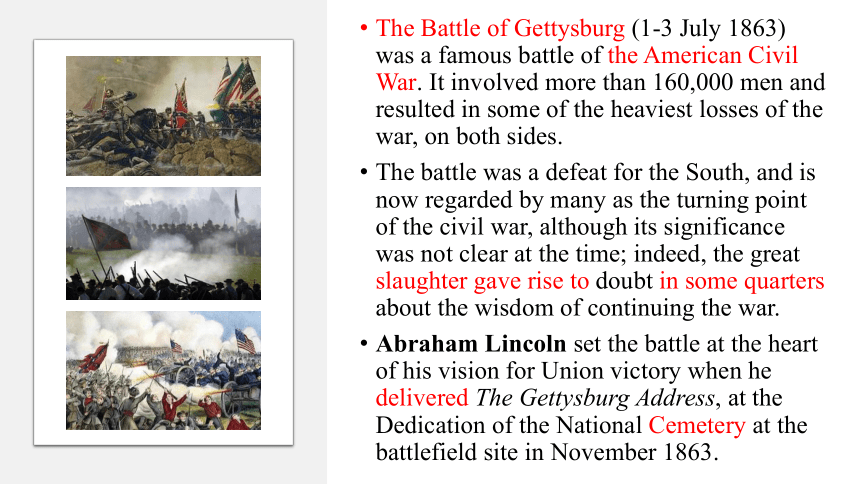
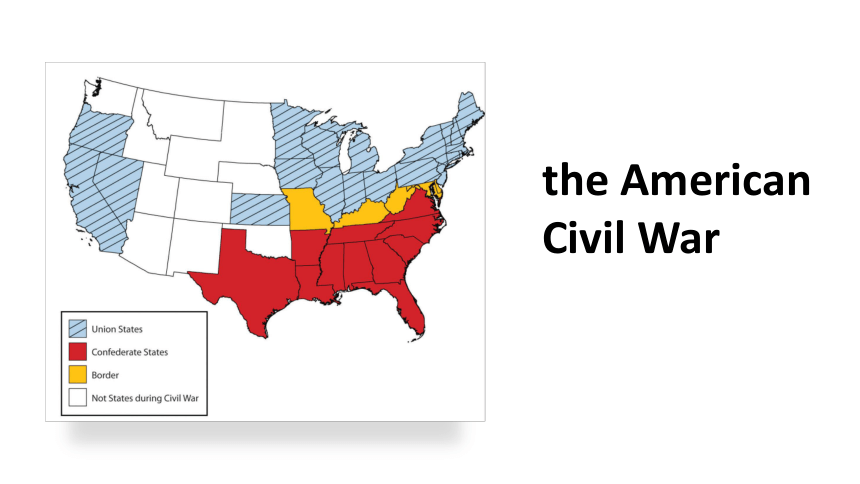
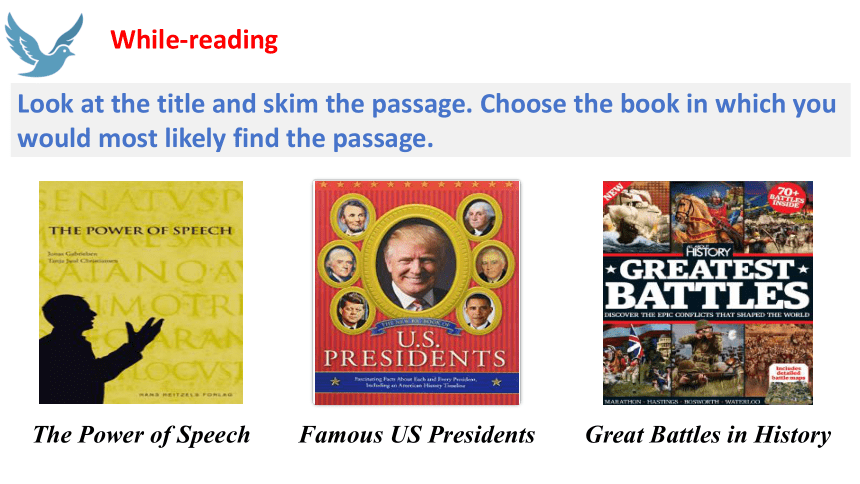
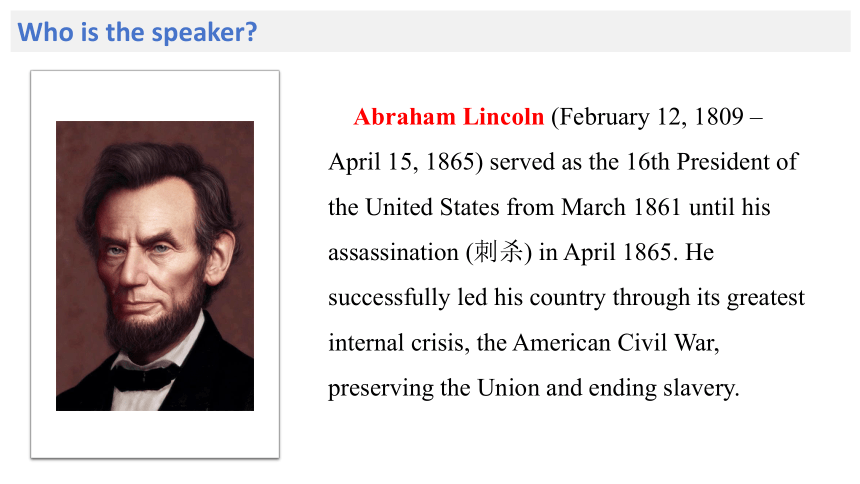

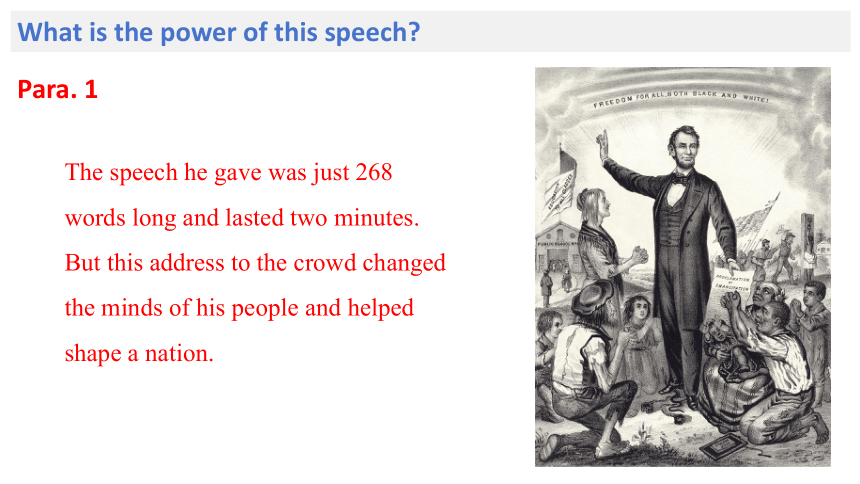
文档简介
(共46张PPT)
Unit 4
Breaking
boundaries
Developing ideas
BY MICHELLE
The Words That Changed A Nation
Lead in
Watch the video and answer the questions.
How did slave owners regard their slaves
What was a slave’s life like
How did slave owners regard their slaves
They didn’t regard them as humans but as animals, without respecting them.
What was a slave’s life like
Daily life for a slave involved backbreaking labor. Slaves had to work all day long without enough rest. They were often physically abused by their owners and had no legal rights.
miserable
desperate
unsufferable
doomed
inhuman
Pre-reading
Background Information
The Battle of Gettysburg
The Battle of Gettysburg (1-3 July 1863) was a famous battle of the American Civil War. It involved more than 160,000 men and resulted in some of the heaviest losses of the war, on both sides.
The battle was a defeat for the South, and is now regarded by many as the turning point of the civil war, although its significance was not clear at the time; indeed, the great slaughter gave rise to doubt in some quarters about the wisdom of continuing the war.
Abraham Lincoln set the battle at the heart of his vision for Union victory when he delivered The Gettysburg Address, at the Dedication of the National Cemetery at the battlefield site in November 1863.
the American Civil War
While-reading
Look at the title and skim the passage. Choose the book in which you would most likely find the passage.
The Power of Speech
Famous US Presidents
Great Battles in History
Abraham Lincoln (February 12, 1809 – April 15, 1865) served as the 16th President of the United States from March 1861 until his assassination (刺杀) in April 1865. He successfully led his country through its greatest internal crisis, the American Civil War, preserving the Union and ending slavery.
Who is the speaker
What is the setting(date&place)?
Para. 1
On 19 November 1863
In a field in Gettysburg, Pennsylvania
The speech he gave was just 268 words long and lasted two minutes. But this address to the crowd changed the minds of his people and helped shape a nation.
What is the power of this speech
Para. 1
What is the background event
Para. 2
The Battle of Gettysburg in 1863, which resulted in over 50,000 casualties.
What was Lincoln’s purpose in giving the speech
Para. 3
He wanted to give the people hope, belief and a reason to look to the future.
He gave them a new vision of what the United States of America should be, based on the ideals set down by its Founding Fathers 87 years before.
What are the ideals conveyed by the speech
Para. 3
The Gettysburg Address
How did Lincoln describe the founding of the US
It was a new nation conceived in Liberty and dedicated to the proposition that all men are created equal.
Para. 4
What challenges did the Civil War bring to the nation
Para. 5
It would test whether a nation conceived in Liberty and dedicated to the proposition that all men are created equal can long endure.
How did Lincoln describe the men who fought in the war
Para. 5
They gave their lives so that their nation might live. They were brave men whose struggles had consecrated the ground.
What was the “great task” that Lincoln described
Para. 6
That this nation shall have a new birth of freedom; and that this government of the people, by the people, for the people, shall not perish from the earth.
Who would be responsible for carrying out this task
Para. 6
The living should be dedicated to the task.
Lincoln talked about government “of the people, by the people, for the people”. What does this mean
“Of the people” means that the government should be made up of or drawn from the people; “by the people” means that the government should be run by ordinary people; “for the people” means that the government should use its power for the people’s benefit.
What other speeches can you think of that stress the importance of breaking boundaries
Example: I Have a Dream
I have a dream that one day on the red hills of Georgia, the sons of former slaves and the sons of former slave owners will be able to sit down together at the table of brotherhood.
What efforts to break boundaries are described in the two reading passages in this unit
In the first passage, doctors or other people of different backgrounds worked together to save people in danger.
In the second passage, Lincoln called on the people of the United States to strive for a free nation where all men are equal.
Post-reading
Work in groups. Give a talk about the significance of abolishing slavery in the US.
1 Organise your ideas by answering the questions.
What was the US like before slavery was abolished
How was it different afterwards
In what ways did the abolition of slavery help to break boundaries
2 Do research to find more evidence to support your ideas.
What was the US like before slavery was abolished
The US was divided into states in the North that prohibited slavery, and states in the South which allowed slavery and depended upon slavery economically. Slavery was a very cruel institution, and caused great human suffering in the states that permitted it. Reliance on slavery also made the South less technologically advanced than the North.
How was it different afterwards
Slaves were freed and were regarded as equal under the law, at least in theory. In practice, black Americans continued to suffer great discrimination in the South for the next hundred years, until the birth of the modern civil rights movement in the 1960s. The legacy of slavery continues to affect race relations in the US today.
In what ways did the abolition of slavery help to break boundaries
The abolition of slavery made former slaves and their former masters equal before the law. This was the first step towards true equality.
Give your talk to the class.
Language points
...he was there in memory of the soldiers who had died. ……他来到这里悼念已逝的战士。
in memory of 为纪念……
【归纳拓展】
have a good/bad memory(for)(对……)记忆力好 / 差
from memory 凭记忆
in honour of 为向……表示敬意 in favour of 赞成,支持
in celebration of 为庆祝…… in support of 支持
in defence of 保卫;为……辩护 in search of 寻找
in need of 需要 in charge of 负责,掌管
in possession of 拥有 in place of 代替
◆用恰当的“in+ n. +of ”型短语填空
(1) Mr Green stood up the 16-year-old boy,saying he was not the one to be blame.
(2) The police were two suspects in connection with the robbery.
(3)The building was called Ford Hall a man named James Ford.
(4)Many Chinese universities provide scholarships for students
financial aid.
(5)You can use milk (代替)cream in this recipe.
in defence of
in search of
in memory of/in honour of
in need of
in place of
Language points
It was what the soldiers had died for. 那也是已故的将士为之献出生命的原因。
die for 为……献出生命,为……而死
【归纳拓展】
die from/of 因……而死
die out 灭绝
die away(声音、风或光等)逐渐消失,逐渐减弱
die down 逐渐变弱;逐渐平息
die off 相继死去,先后死去(直至死光)
be dying for/to do sth. 极想要某物 / 渴望做某事
◆单句语法填空
(1) Do you believe in anything enough to die it
(2) Some kinds of animals are dying in the world.
(3)She waited until the footsteps died .
(4)Because of the pollution,the fish in the river has died .
(5) The fire died ,so we put more coal on it.
for
out
away
off
down
Language points
Now it was up to the living to remove not only the divisions between North and South... 现在,责任落到了生者身上,不仅要消除南北之间的分歧……
It is up to sb. to do sth.
(1)做某事是某人的义务 / 职责 / 责任。
It is up to the travel companies to warn customers of any possible dangers.
(2)由某人决定做某事。
It is up to the manager to make the final decision.
◆完成句子
(1)Life just gives us time and space. (由我们决定去填充它).
(2) 还轮不到你来告诉我怎么做我的事。
me how to do my job.
It’s up to us to fill it
It’s not up to you to tell
Language points
Four score and seven years ago our fathers brought forth, upon this continent, a new nation ... 87 年前,我们的先辈在这块大陆上创立了一个新的国家……
bring forth 使产生,使出现;生产
【归纳拓展】
bring up 养育,抚养;提出;呕吐 bring about 引起,导致
bring back 带回;使回忆起;使恢复 bring down 降低,减少
bring forward 将……提前;提出 bring in 引入;赚得
bring out 使显现,使表现出;公布;生产
◆单句语法填空
(1)Do not boast about tomorrow,for you do not know what a day may bring .
(2) The photos brought some wonderful memories.
(3) His father died when he was young,and he was brought by his mother.
(4)The government has taken measures to bring the high prices of daily goods to keep the market stable.
(5)Working with the medical team in Africa has brought the best in her as a doctor.
forth
back
up
out
down
Language points
...and dedicated to the proposition that all men are created equal. ……献身于人人生而平等的理想。
dedicate v. 致力于,献身于
dedicate one’s time/life/oneself to(doing)sth. 把……奉献给……(to 是介词)
He decided to dedicate his life to psychic healing. 他决定毕生从事心理治疗。
【单词积累】
dedicated adj. 有奉献精神的 dedication n. 献身,奉献
◆单句语法填空
(1)For the next few years,she dedicated (her) to her work.
(2) These leaders should dedicate a certain amount of their time,and money _________ these challenges.
◆完成句子
(3) 她许诺要毕生从事科学研究。
She promised that she would scientific studies.
herself
to
dedicate her life to
Language points
Now we are engaged in a great civil war, testing whether that nation, or any nation, so conceived ,and so dedicated, can long endure.当下我们正深陷于一场大规模的内战之中,它考验着这个国家,或者任何一个生于自由、对上述理想深信不疑的国家,能否长久生存下去。
be engaged in 从事,忙于
【单词积累】
(1)engage v. 雇用,聘请;参加,参与(活动);吸引(某人的兴趣)
engage sb. to do sth. 雇用某人做某事
engage in 参加,参与
engage one’s interest 吸引某人的兴趣
(2)engaged adj. 已订婚的;从事……的;(电话)占线的
Language points
◆单句语法填空
(1) She was engaged in (protect)wild birds.
(2) She was engaged somebody else—I never knew.
(3) I’ve been trying to call him all evening,but I keep getting the
(engage) tone.
◆完成句子
(4) He (正忙于做)his French exercises.
(5) I (已经从事)teaching for more than three years.
(6) I (没时间参加)gossip,so please don’t come to me with your complaints.
protecting
to
engaged
is engaged in doing
have been engaged in
have no time to engage in
Language points
But in a larger sense, we can not dedicate — we can not consecrate — we can not hallow this ground. 但是,从更广泛意义上来说,我们不能献出——不能圣化——不能神化这块土地。
in a larger sense 从更大的意义上来说
【归纳拓展】
in a sense/in one sense/in some senses 从某种意义上来说
in no sense 无论如何都不,决不
in a general sense 从一般意义上来说
make sense 有意义;有道理;是明智的
◆单句语法填空
(1)And (从更大的意义上来说),the market is so depressing that it’s hurting everyone else.
(2)What he says is right, (从某种意义上来说).
(3) 这家酒店怎么也称不上舒适。
The hotel was_______________________________.
(4)It (是明智的)to pay off your debts before you start trying to save money.
in a larger sense
in a sense/in one sense/in some senses
in no sense comfortable
makes sense
Writing a speech
Read the speech on Edgar Snow and answer the questions.
Who was Edgar Snow
What did he do and what boundaries did he break
He was an American journalist who wrote influential books and articles about China in the 1930s.
He actually spent time with the Chinese Red Army and listened to their stories and observed their day-to-day lives. He also conducted interviews with Mao Zedong and other leaders. His book Red Star over China broke ideological boundaries by telling the stories of the Chinese communist movement from the inside.
Complete the table to organise your own speech about another person who has helped to increase understanding between two countries.
Opening
Who the person is:
What boundary he/she has broken:
Body
How he/she achieved this:
Summary
Comments on him/her:
Now write your speech.
Good morning, everyone. Today I’m going to introduce a great man who devoted his life to practising medicine for the people of China – Dr Norman Bethune. He was born in 1890, in Canada. He was a complicated person who was both very creative and very stubborn. He was also very hard-working, and wanted to make a difference in the world. In fact, he invented or improved numerous surgical procedures and surgical instruments. However, it was in China that he would break national boundaries by becoming one of the few Western doctors to help the Chinese in their wartime struggle. His contribution to the welfare of the Chinese people was not only unusual, but immense.
Having married a wealthy woman, Bethune had once enjoyed a luxurious lifestyle in Canada. However, his social conscience developed during the 1930s, with a visit to the Soviet Union and time as a surgeon during the Spanish Civil War. In January 1938, he left Canada again, this time to help the soldiers in China’s Eighth Route Army. It was no easy journey. Travelling thousands of kilometres, he did not reach Yan’an until the end of March. By June, he was working at the front. He soon saw that the medical situation for the troops and local people was bad. There were not enough medicines or surgical instruments, and the medical staff were not well trained.
Bethune worked hard to help the wounded and train his staff, even inventing medical equipment that was suitable for guerilla warfare in China. The pace at which Bethune worked can be seen in a battle during April 1939, when he performed 115 operations in only 69 hours. The Chinese, though they sometimes found Bethune difficult because of his stubbornness, admired him greatly because of his ceaseless hard work and his dedication to helping the Chinese people. But tragedy struck when Bethune cut himself while conducting an operation. He soon contracted blood poisoning and died on 12 November 1939.
Dr Norman Bethune had worked tirelessly as a surgeon, teacher and hospital administrator for the Chinese people. Their struggle became his own. Although he was not Chinese, he sacrificed his life for them. In December 1939, Chairman Mao Zedong wrote an article “In Memory of Norman Bethune”, as a tribute to Bethune, and called on the Chinese people to learn from his example. Dr Norman Bethune remains the greatest inspiration for anyone who believes that we must fight alongside others for justice – even if they are from a different nation to our own.
Presenting ideas
Work in groups. Look at the pictures and make a list of boundaries in society.
Choose one of the boundaries you have listed and talk about how to break that boundary by answering the questions.
What led to the boundary
Who is affected by the boundary
What can be done to remove the boundary
How would society change if the boundary were removed
Prepare a short presentation. Consider the following:
1 the structure of your presentation
2 useful words, expressions and structures
Give your presentation to the class.
Search the Internet to read more about speeches that stress the importance of breaking boundaries.
Write a journal about what you read.
THANKS FOR WATCHING
Unit 4
Breaking
boundaries
Developing ideas
BY MICHELLE
The Words That Changed A Nation
Lead in
Watch the video and answer the questions.
How did slave owners regard their slaves
What was a slave’s life like
How did slave owners regard their slaves
They didn’t regard them as humans but as animals, without respecting them.
What was a slave’s life like
Daily life for a slave involved backbreaking labor. Slaves had to work all day long without enough rest. They were often physically abused by their owners and had no legal rights.
miserable
desperate
unsufferable
doomed
inhuman
Pre-reading
Background Information
The Battle of Gettysburg
The Battle of Gettysburg (1-3 July 1863) was a famous battle of the American Civil War. It involved more than 160,000 men and resulted in some of the heaviest losses of the war, on both sides.
The battle was a defeat for the South, and is now regarded by many as the turning point of the civil war, although its significance was not clear at the time; indeed, the great slaughter gave rise to doubt in some quarters about the wisdom of continuing the war.
Abraham Lincoln set the battle at the heart of his vision for Union victory when he delivered The Gettysburg Address, at the Dedication of the National Cemetery at the battlefield site in November 1863.
the American Civil War
While-reading
Look at the title and skim the passage. Choose the book in which you would most likely find the passage.
The Power of Speech
Famous US Presidents
Great Battles in History
Abraham Lincoln (February 12, 1809 – April 15, 1865) served as the 16th President of the United States from March 1861 until his assassination (刺杀) in April 1865. He successfully led his country through its greatest internal crisis, the American Civil War, preserving the Union and ending slavery.
Who is the speaker
What is the setting(date&place)?
Para. 1
On 19 November 1863
In a field in Gettysburg, Pennsylvania
The speech he gave was just 268 words long and lasted two minutes. But this address to the crowd changed the minds of his people and helped shape a nation.
What is the power of this speech
Para. 1
What is the background event
Para. 2
The Battle of Gettysburg in 1863, which resulted in over 50,000 casualties.
What was Lincoln’s purpose in giving the speech
Para. 3
He wanted to give the people hope, belief and a reason to look to the future.
He gave them a new vision of what the United States of America should be, based on the ideals set down by its Founding Fathers 87 years before.
What are the ideals conveyed by the speech
Para. 3
The Gettysburg Address
How did Lincoln describe the founding of the US
It was a new nation conceived in Liberty and dedicated to the proposition that all men are created equal.
Para. 4
What challenges did the Civil War bring to the nation
Para. 5
It would test whether a nation conceived in Liberty and dedicated to the proposition that all men are created equal can long endure.
How did Lincoln describe the men who fought in the war
Para. 5
They gave their lives so that their nation might live. They were brave men whose struggles had consecrated the ground.
What was the “great task” that Lincoln described
Para. 6
That this nation shall have a new birth of freedom; and that this government of the people, by the people, for the people, shall not perish from the earth.
Who would be responsible for carrying out this task
Para. 6
The living should be dedicated to the task.
Lincoln talked about government “of the people, by the people, for the people”. What does this mean
“Of the people” means that the government should be made up of or drawn from the people; “by the people” means that the government should be run by ordinary people; “for the people” means that the government should use its power for the people’s benefit.
What other speeches can you think of that stress the importance of breaking boundaries
Example: I Have a Dream
I have a dream that one day on the red hills of Georgia, the sons of former slaves and the sons of former slave owners will be able to sit down together at the table of brotherhood.
What efforts to break boundaries are described in the two reading passages in this unit
In the first passage, doctors or other people of different backgrounds worked together to save people in danger.
In the second passage, Lincoln called on the people of the United States to strive for a free nation where all men are equal.
Post-reading
Work in groups. Give a talk about the significance of abolishing slavery in the US.
1 Organise your ideas by answering the questions.
What was the US like before slavery was abolished
How was it different afterwards
In what ways did the abolition of slavery help to break boundaries
2 Do research to find more evidence to support your ideas.
What was the US like before slavery was abolished
The US was divided into states in the North that prohibited slavery, and states in the South which allowed slavery and depended upon slavery economically. Slavery was a very cruel institution, and caused great human suffering in the states that permitted it. Reliance on slavery also made the South less technologically advanced than the North.
How was it different afterwards
Slaves were freed and were regarded as equal under the law, at least in theory. In practice, black Americans continued to suffer great discrimination in the South for the next hundred years, until the birth of the modern civil rights movement in the 1960s. The legacy of slavery continues to affect race relations in the US today.
In what ways did the abolition of slavery help to break boundaries
The abolition of slavery made former slaves and their former masters equal before the law. This was the first step towards true equality.
Give your talk to the class.
Language points
...he was there in memory of the soldiers who had died. ……他来到这里悼念已逝的战士。
in memory of 为纪念……
【归纳拓展】
have a good/bad memory(for)(对……)记忆力好 / 差
from memory 凭记忆
in honour of 为向……表示敬意 in favour of 赞成,支持
in celebration of 为庆祝…… in support of 支持
in defence of 保卫;为……辩护 in search of 寻找
in need of 需要 in charge of 负责,掌管
in possession of 拥有 in place of 代替
◆用恰当的“in+ n. +of ”型短语填空
(1) Mr Green stood up the 16-year-old boy,saying he was not the one to be blame.
(2) The police were two suspects in connection with the robbery.
(3)The building was called Ford Hall a man named James Ford.
(4)Many Chinese universities provide scholarships for students
financial aid.
(5)You can use milk (代替)cream in this recipe.
in defence of
in search of
in memory of/in honour of
in need of
in place of
Language points
It was what the soldiers had died for. 那也是已故的将士为之献出生命的原因。
die for 为……献出生命,为……而死
【归纳拓展】
die from/of 因……而死
die out 灭绝
die away(声音、风或光等)逐渐消失,逐渐减弱
die down 逐渐变弱;逐渐平息
die off 相继死去,先后死去(直至死光)
be dying for/to do sth. 极想要某物 / 渴望做某事
◆单句语法填空
(1) Do you believe in anything enough to die it
(2) Some kinds of animals are dying in the world.
(3)She waited until the footsteps died .
(4)Because of the pollution,the fish in the river has died .
(5) The fire died ,so we put more coal on it.
for
out
away
off
down
Language points
Now it was up to the living to remove not only the divisions between North and South... 现在,责任落到了生者身上,不仅要消除南北之间的分歧……
It is up to sb. to do sth.
(1)做某事是某人的义务 / 职责 / 责任。
It is up to the travel companies to warn customers of any possible dangers.
(2)由某人决定做某事。
It is up to the manager to make the final decision.
◆完成句子
(1)Life just gives us time and space. (由我们决定去填充它).
(2) 还轮不到你来告诉我怎么做我的事。
me how to do my job.
It’s up to us to fill it
It’s not up to you to tell
Language points
Four score and seven years ago our fathers brought forth, upon this continent, a new nation ... 87 年前,我们的先辈在这块大陆上创立了一个新的国家……
bring forth 使产生,使出现;生产
【归纳拓展】
bring up 养育,抚养;提出;呕吐 bring about 引起,导致
bring back 带回;使回忆起;使恢复 bring down 降低,减少
bring forward 将……提前;提出 bring in 引入;赚得
bring out 使显现,使表现出;公布;生产
◆单句语法填空
(1)Do not boast about tomorrow,for you do not know what a day may bring .
(2) The photos brought some wonderful memories.
(3) His father died when he was young,and he was brought by his mother.
(4)The government has taken measures to bring the high prices of daily goods to keep the market stable.
(5)Working with the medical team in Africa has brought the best in her as a doctor.
forth
back
up
out
down
Language points
...and dedicated to the proposition that all men are created equal. ……献身于人人生而平等的理想。
dedicate v. 致力于,献身于
dedicate one’s time/life/oneself to(doing)sth. 把……奉献给……(to 是介词)
He decided to dedicate his life to psychic healing. 他决定毕生从事心理治疗。
【单词积累】
dedicated adj. 有奉献精神的 dedication n. 献身,奉献
◆单句语法填空
(1)For the next few years,she dedicated (her) to her work.
(2) These leaders should dedicate a certain amount of their time,and money _________ these challenges.
◆完成句子
(3) 她许诺要毕生从事科学研究。
She promised that she would scientific studies.
herself
to
dedicate her life to
Language points
Now we are engaged in a great civil war, testing whether that nation, or any nation, so conceived ,and so dedicated, can long endure.当下我们正深陷于一场大规模的内战之中,它考验着这个国家,或者任何一个生于自由、对上述理想深信不疑的国家,能否长久生存下去。
be engaged in 从事,忙于
【单词积累】
(1)engage v. 雇用,聘请;参加,参与(活动);吸引(某人的兴趣)
engage sb. to do sth. 雇用某人做某事
engage in 参加,参与
engage one’s interest 吸引某人的兴趣
(2)engaged adj. 已订婚的;从事……的;(电话)占线的
Language points
◆单句语法填空
(1) She was engaged in (protect)wild birds.
(2) She was engaged somebody else—I never knew.
(3) I’ve been trying to call him all evening,but I keep getting the
(engage) tone.
◆完成句子
(4) He (正忙于做)his French exercises.
(5) I (已经从事)teaching for more than three years.
(6) I (没时间参加)gossip,so please don’t come to me with your complaints.
protecting
to
engaged
is engaged in doing
have been engaged in
have no time to engage in
Language points
But in a larger sense, we can not dedicate — we can not consecrate — we can not hallow this ground. 但是,从更广泛意义上来说,我们不能献出——不能圣化——不能神化这块土地。
in a larger sense 从更大的意义上来说
【归纳拓展】
in a sense/in one sense/in some senses 从某种意义上来说
in no sense 无论如何都不,决不
in a general sense 从一般意义上来说
make sense 有意义;有道理;是明智的
◆单句语法填空
(1)And (从更大的意义上来说),the market is so depressing that it’s hurting everyone else.
(2)What he says is right, (从某种意义上来说).
(3) 这家酒店怎么也称不上舒适。
The hotel was_______________________________.
(4)It (是明智的)to pay off your debts before you start trying to save money.
in a larger sense
in a sense/in one sense/in some senses
in no sense comfortable
makes sense
Writing a speech
Read the speech on Edgar Snow and answer the questions.
Who was Edgar Snow
What did he do and what boundaries did he break
He was an American journalist who wrote influential books and articles about China in the 1930s.
He actually spent time with the Chinese Red Army and listened to their stories and observed their day-to-day lives. He also conducted interviews with Mao Zedong and other leaders. His book Red Star over China broke ideological boundaries by telling the stories of the Chinese communist movement from the inside.
Complete the table to organise your own speech about another person who has helped to increase understanding between two countries.
Opening
Who the person is:
What boundary he/she has broken:
Body
How he/she achieved this:
Summary
Comments on him/her:
Now write your speech.
Good morning, everyone. Today I’m going to introduce a great man who devoted his life to practising medicine for the people of China – Dr Norman Bethune. He was born in 1890, in Canada. He was a complicated person who was both very creative and very stubborn. He was also very hard-working, and wanted to make a difference in the world. In fact, he invented or improved numerous surgical procedures and surgical instruments. However, it was in China that he would break national boundaries by becoming one of the few Western doctors to help the Chinese in their wartime struggle. His contribution to the welfare of the Chinese people was not only unusual, but immense.
Having married a wealthy woman, Bethune had once enjoyed a luxurious lifestyle in Canada. However, his social conscience developed during the 1930s, with a visit to the Soviet Union and time as a surgeon during the Spanish Civil War. In January 1938, he left Canada again, this time to help the soldiers in China’s Eighth Route Army. It was no easy journey. Travelling thousands of kilometres, he did not reach Yan’an until the end of March. By June, he was working at the front. He soon saw that the medical situation for the troops and local people was bad. There were not enough medicines or surgical instruments, and the medical staff were not well trained.
Bethune worked hard to help the wounded and train his staff, even inventing medical equipment that was suitable for guerilla warfare in China. The pace at which Bethune worked can be seen in a battle during April 1939, when he performed 115 operations in only 69 hours. The Chinese, though they sometimes found Bethune difficult because of his stubbornness, admired him greatly because of his ceaseless hard work and his dedication to helping the Chinese people. But tragedy struck when Bethune cut himself while conducting an operation. He soon contracted blood poisoning and died on 12 November 1939.
Dr Norman Bethune had worked tirelessly as a surgeon, teacher and hospital administrator for the Chinese people. Their struggle became his own. Although he was not Chinese, he sacrificed his life for them. In December 1939, Chairman Mao Zedong wrote an article “In Memory of Norman Bethune”, as a tribute to Bethune, and called on the Chinese people to learn from his example. Dr Norman Bethune remains the greatest inspiration for anyone who believes that we must fight alongside others for justice – even if they are from a different nation to our own.
Presenting ideas
Work in groups. Look at the pictures and make a list of boundaries in society.
Choose one of the boundaries you have listed and talk about how to break that boundary by answering the questions.
What led to the boundary
Who is affected by the boundary
What can be done to remove the boundary
How would society change if the boundary were removed
Prepare a short presentation. Consider the following:
1 the structure of your presentation
2 useful words, expressions and structures
Give your presentation to the class.
Search the Internet to read more about speeches that stress the importance of breaking boundaries.
Write a journal about what you read.
THANKS FOR WATCHING
